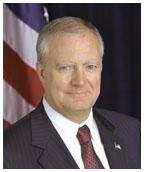
Photo: White House Office of Science and Technology Policy |
John H. Marburger III ’62
As science adviser to President George W. Bush and director of the Office of Science and Technology Policy, John H. Marburger III ’62 helps coordinate science policy throughout the executive branch. His tenure has had its share of controversy: Although a group of scientists last winter asserted that the Bush administration distorted scientific findings to support its policy goals, Marburger has said that the scientists’ report contained incorrect generalizations and did not point to political interference in science. A physicist and former university president, Marburger spoke with PAW’s Mark F. Bernstein ’83.
You have written that even when the science on an issue is clear, it is only one input into the policymaking process. What is an example?
Take responses to climate change. The issue isn’t whether the earth is warming; the issue is what you should do about it. It’s pretty clear to me that if you want to reduce the amount of carbon dioxide in the atmosphere, you have to change the way you generate and use energy. There’s a lot of disagreement about just how you should go about doing that. Should you just regulate it away or should you provide the basic technical infrastructure of ideas for industry to respond in some market-oriented way? These are choices that are driven by economic and political considerations, and not only by science.
We’re in the middle of an election year. Is there a line between science and politics?
I think there is. Science has its own machinery, and while the way money gets into that machinery is certainly subject to political decisions, how the machinery works is pretty much managed through the social process of science itself. Science is a social activity and there is a kind of politics within science, but that’s not the same thing as trying to get people elected. Most people who do science in America are not conscious of that sort of overt political pressure. You can point to periods in history where political ideology has intruded on the scientific process, and you can easily tell when it has. But in this country, that doesn’t really happen.
One of the things the administration has identified as a goal is manned space exploration to the moon and to Mars. Can this capture the public imagination the way the first moon project did?
I like to think of this as a rational approach to the long-term development of space as a part of the domain of humanity. You need to ask what you would have to do that would not just be a series of expensive tours de force but rather a natural incorporation of space activities into the life of human beings. One of the problems is the expense of putting things into space. In order to have long-term, commercially viable activities in space, you have to have some way of exploiting material that’s already up there so you don’t have to take all your fuel with you. More than 90 percent of the mass of a launch is fuel, and most of that is oxygen. Most of the surface of the moon is made from metal oxides, so if you could separate out the oxygen on the moon, you would have much of what you would need for fueling a spacecraft going to Mars or anywhere else. So the vision is to begin to build permanent infrastructure on the moon that reduces the cost of everything that follows. It’s not about just sending people up with a flag. It’s about learning how to make space our own in some very pragmatic sense.
It seems to be a perennial concern that American science education is inadequate. Are those concerns valid?
The real concern is that we’re not preparing enough young people in the K-12 years for them to fulfill their aspirations to become scientists when they get to college. We’re losing too big a fraction of the young people who aspire to be scientists and engineers within the first two years of college when they hit those tough courses. In most cases, the reason people drop out is because their quantitative skills just aren’t up to it. That’s one of the reasons that the administration has tried to focus on the quality of math and science teaching in the early grades.
A report in the New York Times this spring suggested that the United States may be losing its dominance in the sciences. Should Americans be concerned?
There certainly is no immediate cause for concern because we’re so far ahead of every other country that it would be a very long time before we lost our leadership position. On the other hand, it’s true that other countries are beginning to develop economically and socially, so that the number of people they are able to educate and provide technical jobs for is also increasing. Some countries that are moving very fast also have huge populations, particularly China. I think that in the future, the U.S. can expect to have many partners for its top-ranked science productivity, but I don’t see us losing our edge any time soon.
You arrived at Princeton in 1958, not long after the launch of Sputnik. Did that spur your interest to become a physicist?
When I came to Princeton, the lecture halls were filled with young people
who aspired to be physicists. Most of them ended up doing something else.
But I’ve always wanted to be a physicist, for as long as I can remember.
I still want to be a physicist. ![]()

